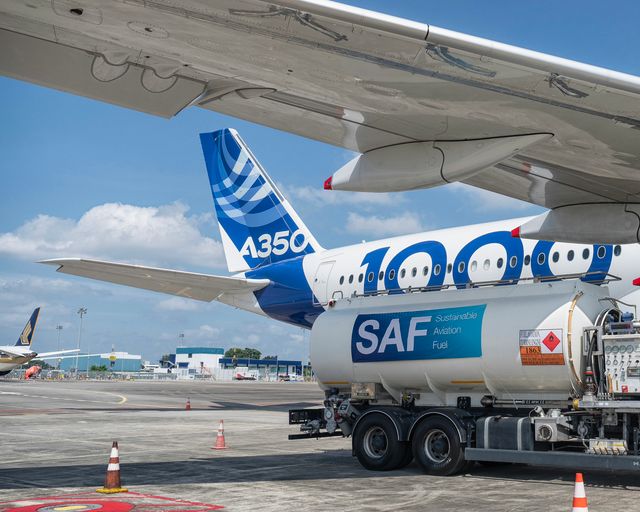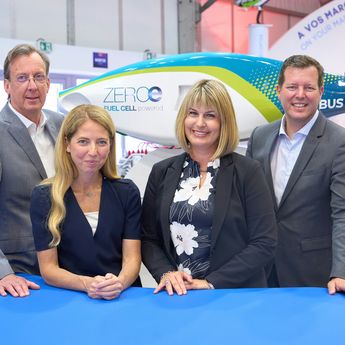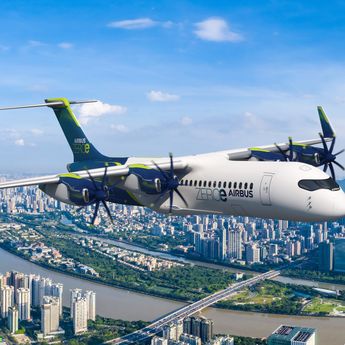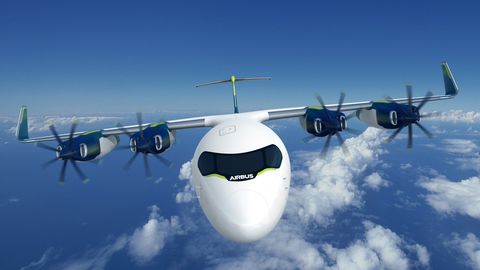Investing in hydrogen propulsion technology
AN ESSENTIAL ELEMENT
To ensure that future generations can continue to experience the joy of flying, Airbus is investing in several promising decarbonisation solutions. One of these is hydrogen, as hydrogen-powered aircraft offer the potential to reduce aviation's reliance on fossil fuels.
Hydrogen has been safely and effectively used in the space and automobile industries for decades. Today’s challenge is to adapt its use to commercial aviation. Hydrogen’s extremely high energy-to-mass ratio makes it very appealing for aerospace applications, providing the potential for significantly cutting emissions. The main hurdle is its low ambient density, which means it needs to be stored on the aircraft at -253°C. This requires advanced storage technologies to make hydrogen practical for use on an aircraft.
Airbus committed to taking on this challenge in 2020 when it launched the ZEROe project, which aims to bring a hydrogen-powered aircraft to the skies. After investing in research into both hydrogen combustion and hydrogen fuel cell technology, Airbus determined in 2025 that fuel cells are the most promising option for a future hydrogen-powered aircraft.
ZEROe: a hydrogen-powered, fully electric aircraft
FUTURE AIRCRAFT
After extensive research, Airbus has determined that the most promising use for hydrogen in aviation is through hydrogen fuel cells. This means the future ZEROe aircraft will be fully electric. It will feature four electric propellers, each powered by hydrogen fuel cells, which transform the hydrogen into electricity through a chemical reaction.

Developing hydrogen fuel cells for aviation purposes
POWERING HYDROGEN FLIGHT
After almost five years of research into hydrogen propulsion, Airbus has determined that the most promising technology will be hydrogen fuel cells. These cells are scalable, meaning they can be combined into fuel cell stacks to increase their power output. Airbus founded Aerostack, a joint venture with ElringKlinger, to research, develop and assemble the fuel cell stacks for the future ZEROe aircraft.
Contributing to a global hydrogen ecosystem
COLLABORATING ON HYDROGEN
In order for ZEROe to be a success, more investment in hydrogen storage and infrastructure is needed. Significant technological, economic, and regulatory hurdles remain before hydrogen can be adopted at scale within the aviation sector. To support the expansion of this industry, Airbus is collaborating with a variety of industry players, including energy providers and airports, to ensure hydrogen can help us to take significant steps towards decarbonising aviation.

Contributing to global decarbonisation goals
A DIVERSIFIED APPROACH
Airbus is committed to helping the aviation industry decarbonise. The ZEROe project is just one of several pathways we are pursuing in pursuit of this goal. We are also developing a next-generation single-aisle aircraft that will bring significant improvements in costs, operations and emissions reductions. In parallel, we are investing in future technologies, air traffic management solutions, sustainable aviation fuels and more.
The latest in hydrogen
In the spotlight
-

Airbus and MTU Aero Engines advance on hydrogen fuel cell technology for aviation
Press Release
Innovation
Airbus and MTU Aero Engines have signed a Memorandum of Understanding (MoU) to progress together on hydrogen fuel cell propulsion. -

Airbus showcases hydrogen aircraft technologies during its 2025 Airbus Summit
Press Release
Innovation
-

Developing a global ecosystem to support hydrogen-powered flight
Web Story
Innovation
-

Airbus partners with Avolon to explore future of hydrogen aviation
Press Release
Innovation
-

Airbus welcomes London Gatwick to global hydrogen hub network
Press Release
Innovation





